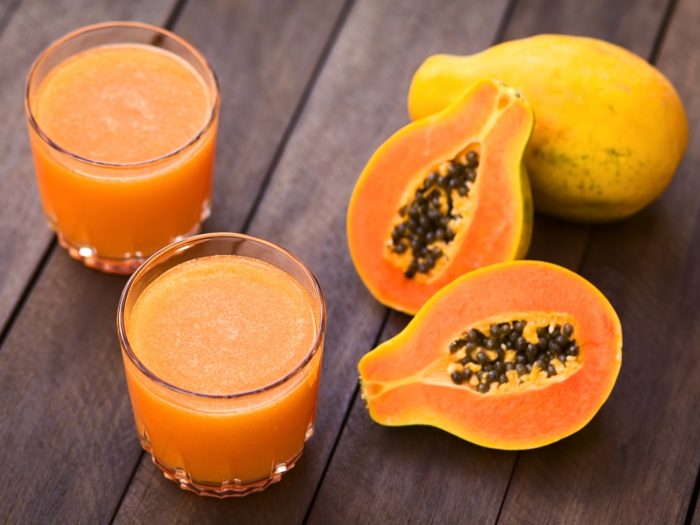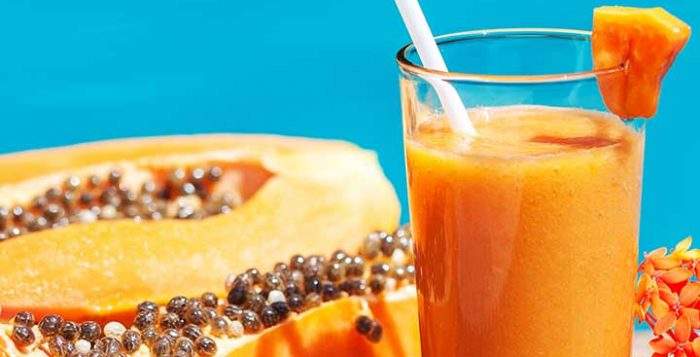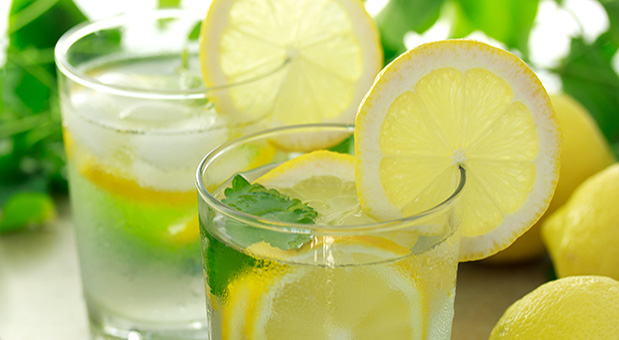There are many reasons why drinking papaya juice has become more popular in recent years, although it has been a cultural staple in many areas of the world for centuries.
What is Papaya Juice?
Papaya juice is made from the fruit of the papaya tree, which is native to the tropical areas of the Americas, particularly Mesoamerica and the Caribbean. The fruit is actually a large berry and is roughly the same size as a large potato. The outside of the ripe fruit is an amber or orange color and you can tell when the fruit is ripe when the outer skin is slightly soft to the touch. The inside of the fruit has a cavity filled with dozens of black seeds in a clear pulp, but the orange flesh is the part of the fruit that is eaten, and also turned into juice.
Papaya juice benefits from a rich supply of vitamin and nutrients including vitamin C and folate in large quantities, followed by vitamin A, beta-carotene, vitamin E, vitamin K, various B-family vitamins, magnesium, potassium, calcium, phosphorus, iron, manganese, and a number of phytochemicals, carotenoids and other antioxidant compounds. While many people choose to eat papaya fruit raw, you can get an even more concentrated boost of these nutrients if you choose to drink papaya juice. It is not the most widely available juice on the market, but it is also quite easy to make at home so you can enjoy its many health benefits.
Benefits of Papaya Juice
Some of the best benefits papaya juice offers are its ability to clear up skin inflammation, lower blood pressure, strengthen the immune system, prevent chronic disease and cancer, improve nerve function, build strong bones, boost cardiovascular health, aid vision, and reduce inflammation.
Prevents Cancer
This exotic fruit has a wealth of beta-carotene, lycopene, beta-cryptoxanthin and isothiocyanates, all of which seek out and neutralize free radicals in the body that can cause mutation and cancer. Some of these active ingredients also promote the production of tumor-suppressing proteins, making this juice both a preventative measure and a supplementary treatment.
Strengthens Nervous System
High levels of copper are required for our nervous system to effectively communicate with other parts of the body. Although copper is often overlooked, it is found in significant levels in papaya juice.
Promotes Strong Bones
Papaya juice contains nearly a dozen different minerals, and while some of them are in trace amounts, many of them contribute to the strength and durability of your bones. By increasing bone mineral density with a glass of this juice each morning, you can prevent or delay osteoporosis as you age.

Soothes Inflammation
Papain is a critical digestive enzyme found in this tropical fruit but it also has anti-inflammatory properties that can affect the rest of the body. Combined with vitamin C and other antioxidants in this fruit, it can soothe symptoms of arthritis, headache, gout, irritable bowel syndrome and high blood pressure, among others.
Reduces Blood Pressure
A more specific blood pressure-lowering compound in papaya juice is potassium. This legendary vasodilator will relieve stress and strain on your cardiovascular system by easing the tension in blood vessels and promoting better circulation.
Improves Heart Health
Not only is papaya juice rich in antioxidants, which can lower the oxidative stress in blood vessels and arteries, but it is also a rich source of folate, which can suppress homocysteine levels and keep your cholesterol levels down. In addition to vitamin C and other key minerals, this can protect the integrity of your arteries and lower your risk of cardiovascular disease.
Boosts Immunity
A single papaya has more than 300% of the daily required vitamin C intake for an adult male, and while some of that vitamin C will be lost in the blending process, it still gives you an incredible immune system boost, particularly when supported by arange of antioxidants that prevent mutation and chronic disease.
Improves Vision
Boasting high levels of beta-carotene, papaya is well known as a vision booster, capable of preventing the oxidative stress in the retina that causes macular degeneration, while also slowing down the development of cataracts.
How to Make Papaya Juice?
Papaya juice can be purchased at some grocery stores but papaya nectar is also a popular product, which offers more added sugar and less overall nutrients. So be careful about what variety you are purchasing. Making your own juice at home also guarantees that you know precisely what is being added to this healthy drink. Papaya has a very strong sweet flavor, so most recipes include other fruits or spices to make the drink more palatable.
Recipe
Ingredients:
- 1 fresh papaya, chopped
- 1/2 cup of fresh pineapple
- 2 teaspoons of honey
- 1 cup of water, filtered
Step 1 – Remove the skin from the papaya, cut it in half, and scoop out the seeds.
Step 2 – Chop the papaya into chunks that can fit in your blender.
Step 3 – Add the papaya, pineapple, honey and water to the blender.
Step 4 – Blend thoroughly for 2-3 minutes until the beverage has a smooth consistency.
Step 5 – You can add more water or pineapple juice if the mixture is still too thick.
Step 6 – Add more honey for sweetness, if desired and blend for another 5-10 seconds.
Step 7 – Serve chilled and enjoy!
Note: Unlike many other fruit juices, papaya is not high in fibrous material when blended, so there is no need to use a sieve or filter to remove the pulp.
How Long Can You Store Papaya Juice?
Preparing this juice should always be done with ripe fruit, and the juice should be consumed relatively soon after preparing. Most experts recommend drinking any prepared juice or smoothie within 24-36 hours. Once fruit becomes exposed to oxygen, many varieties will begin to oxidize, causing a change in the color and the quality of the nutrients. A great way to slow down the oxidation of the juice is to add a few drops of lemon juice.
Papaya juice has a number of powerful enzymes that will actually begin to break down the components of other juice, if you blend them, so it is best not to store this juice for very long. Refrigerating your papaya juice for 12-24 hours in an airtight container should help it retain most of its nutrients and flavor.
Side Effects of Papaya Juice
While many people praise the benefits of papaya juice, there are some potential side effects that should be taken into consideration, such as skin discoloration, stomach problems, an increased risk of kidney stones and possible allergic reactions. In most cases, these side effects can be avoided by consuming this juice in moderation but for those with sensitive stomachs or allergies, consume this juice with caution.
- Stomach Upset – One of the active ingredients in papaya, called papain, is excellent for gastrointestinal issues when consumed in normal amounts. However, if too much of this enzyme enters the system, it can cause bloating, cramping, diarrhea and other stomach problems.
- Skin Discoloration – Papayas are packed with beta-carotene, a powerful antioxidant that helps the body in many different ways, but if you go overboard with drinking papaya juice, it can turn your skin into an orange hue. This is harmless, and will normally go away within a day or so.
- Kidney Problems – This tropical fruit is overflowing with vitamin C, which is excellent news for your immune system, but having too much vitamin C in your system can cause a rise in oxalate levels in the body, which can contribute to the development of kidney stones. If you already suffer from kidney issues, speak with a doctor before adding this juice to your daily diet.
- Allergic Reactions – The digestive enzyme in papayas can also act as an allergen for certain people, causing shortness of breath, runny nose or itchy eyes but generally, the symptoms are mild. 1-2 glasses of papaya juice per day is more than enough to enjoy the benefits without suffering from the side effects.





